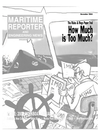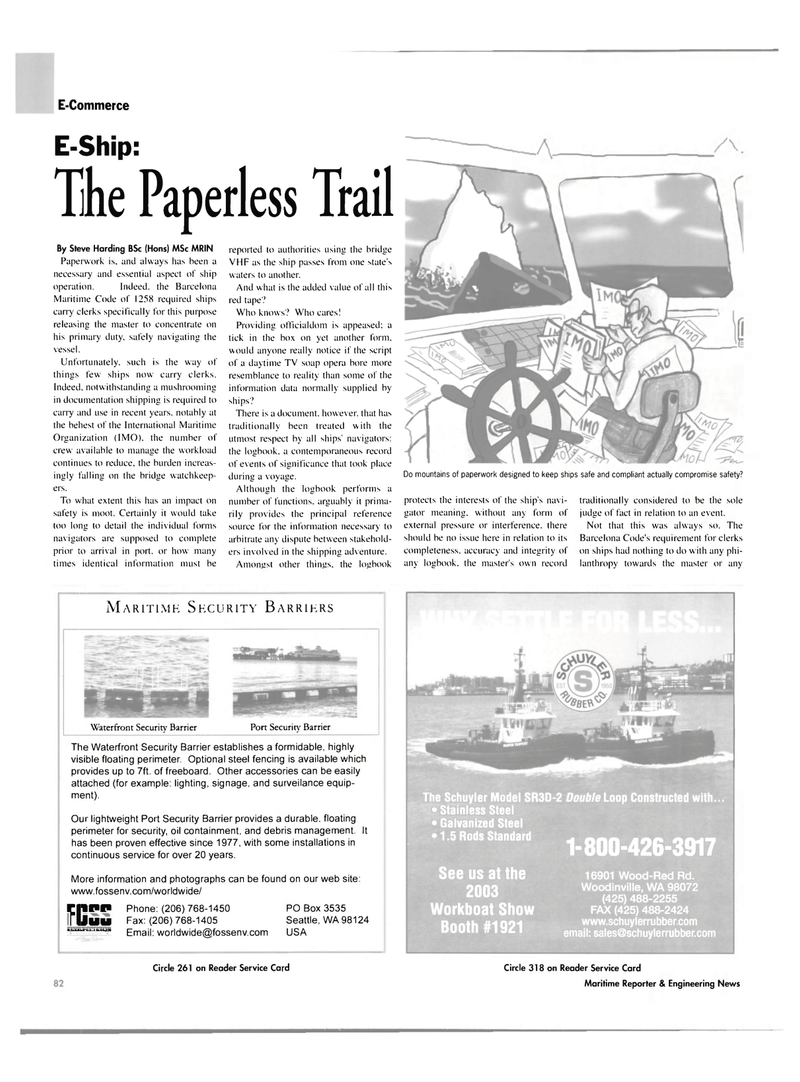
Page 85: of Maritime Reporter Magazine (November 2003)
Read this page in Pdf, Flash or Html5 edition of November 2003 Maritime Reporter Magazine
E-Commerce
E-Ship:
The Paperless Trail
By Steve Harding BSc (Hons) MSc MRIN
Paperwork is, and always has been a necessary and essential aspect of ship operation. Indeed, the Barcelona
Maritime Code of 1258 required ships carry clerks specifically for this purpose releasing the master to concentrate on his primary duty, safely navigating the vessel.
Unfortunately, such is the way of things few ships now carry clerks.
Indeed, notwithstanding a mushrooming in documentation shipping is required to carry and use in recent years, notably at the behest of the International Maritime
Organization (IMO). the number of crew available to manage the workload continues to reduce, the burden increas- ingly falling on the bridge watchkeep- ers.
To what extent this has an impact on safety is moot. Certainly it would take too long to detail the individual forms navigators are supposed to complete prior to arrival in port, or how many times identical information must be reported to authorities using the bridge
VHF as the ship passes from one state's waters to another.
And what is the added value of all this red tape'.'
Who knows? Who cares!
Providing officialdom is appeased; a tick in the box on yet another form, would anyone really notice if the script of a daytime TV soap opera bore more resemblance to reality than some of the information data normally supplied by ships?
There is a document, however, that has traditionally been treated with the utmost respect by all ships' navigators: the logbook, a contemporaneous record of events of significance that took place during a voyage.
Although the logbook performs a number of functions, arguably it prima- rily provides the principal reference source for the information necessary to arbitrate any dispute between stakehold- ers involved in the shipping adventure.
Amongst other things, the logbook
Do mountains of paperwork designed to keep ships safe and compliant actually compromise safety? protects the interests of the ship's navi- gator meaning, without any form of external pressure or interference, there should be no issue here in relation to its completeness, accuracy and integrity of any logbook, the master's own record traditionally considered to be the sole judge of fact in relation to an event.
Not that this was always so. The
Barcelona Code's requirement for clerks on ships had nothing to do with any phi- lanthropy towards the master or any
Circle 261 on Reader Service Card Circle 318 on Reader Service Card
Maritime Reporter & Engineering News
Port Security Barrier Waterfront Security Barrier
MARITIME SECURITY BARRIERS
The Waterfront Security Barrier establishes a formidable, highly visible floating perimeter. Optional steel fencing is available which provides up to 7ft. of freeboard. Other accessories can be easily attached (for example: lighting, signage, and surveilance equip- ment).
Our lightweight Port Security Barrier provides a durable, floating perimeter for security, oil containment, and debris management. It has been proven effective since 1977, with some installations in continuous service for over 20 years.
More information and photographs can be found on our web site: www.fossenv.com/worldwide/ rilPIB Phone: (206) 768-1450 PO Box 3535 rilUM Fax:(206)768-1405 Seattle, WA 98124
BDhi-iii.-.i«if.n Emaj|: [email protected] USA
The Schuyler Model SR3D-2 Double Loop Constructed with. • Stainless Steel • Galvanized Steel 1.5 Rods Standard 1-800-426-3917
See us at the 2003
Workboat Show
Booth #1921 16901 Wood-Red Rd.
Woodinville, WA 98072 (425) 488-2255
FAX (425) 488-2424 www.schuylerrubber.com email: [email protected]

 84
84

 86
86
